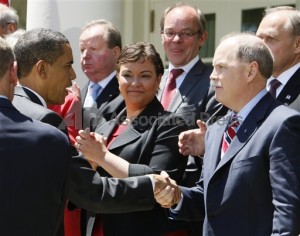
The dispute over GM exporting jobs is shaping up to become a major political headache for the Obama Administration, with its claims to be promoting policies that will create American jobs.
General Motors Corporation late today filed a prospectus supplement with the Securities and Exchange Commission about its exchange offers for $27 billion of its unsecured public notes and the related consent solicitations that began on April 27, 2009.
In plain English, the filed supplement says that as of today GM has not reached agreements with its bondholders about a debt-for-equity swap — and it is unlikely to do so before the midnight May 26, 2009 expiration date.
Since the swap is a key element in its revised “viability plan” bankruptcy appears certain. The bondholder deal is necessary to obtain the agreement of the U.S. Treasury Department for further financing. It is also needed for the United Auto Workers Union and the VEBA-settlement class representative to accept GM stock for cash payments due. Bondholders, as they did in the case of the now bankrupt Chrysler LLC, are not cooperating. And the UAW is taking a hard line over other aspects of the plan.
Ron Gettelfinger, president of the UAW, spent the afternoon at the U.S. Treasury Department in Washington, D.C. While not commenting directly on what the issues concerning the union are, Gettelfinger went public over the weekend with at least one of them by releasing a letter to members of Congress that complained about the doubling of imports by GM from non-union and restricted-trade countries in Asia. The union wants job guarantees as part of the fragile, controversial deal Treasury is trying to put together to save GM.
Alan Reuther, UAW Legislative Director, wrote Congress that “As the discussions continue concerning the restructuring of General Motors, the UAW wishes to restate our strong opposition to the company’s plan to close 16 manufacturing facilities in the United States, while at the same time dramatically increasing the number of vehicles it will be importing from Mexico, Korea, Japan and China for sale in this country. We urge Members of Congress to join with the UAW in urging the Obama administration to insist, as part of any further government assistance, that GM should be required to maintain the maximum number of jobs in the U.S., instead of outsourcing more production to these other countries.”
The dispute over the GM viability plan is becoming a major political headache for the Obama Administration, with its claims to be promoting policies that will create American jobs, not export them.
GM now expects to announce on May 27 whether the expiration date for the swap will be extended or whether the exchange offers have expired and will not be consummated for failure to satisfy one or more of the conditions. GM has previously stated that it would not change the terms that it is offering bondholders. If the pattern sounds familiar to what happened as the Chrysler deadline approached last month, your memory is sound.
In the unlikely event GM reaches agreement with its bond exchange offers on or prior to May 26, 2009 (or to a later date, if the offers are extended), it will disclose the terms of these agreements. Although withdrawal rights may not be extended or reinstated, GM said, bondholders would continue to have the right to tender old notes until the expiration or termination of the exchange offers.
As with the Chrysler bankruptcy, the GM negotiations are going to extend right down to the June 1 Treasury deadline. I’m betting the end result will be the same.
